Unit 2 Keeping Healthy Topic 2 Section C 精品课件 +嵌入音频(共36张PPT)
文档属性
| 名称 | Unit 2 Keeping Healthy Topic 2 Section C 精品课件 +嵌入音频(共36张PPT) |  | |
| 格式 | pptx | ||
| 文件大小 | 30.8MB | ||
| 资源类型 | 教案 | ||
| 版本资源 | 仁爱科普版 | ||
| 科目 | 英语 | ||
| 更新时间 | 2023-09-27 11:38:00 | ||
图片预览

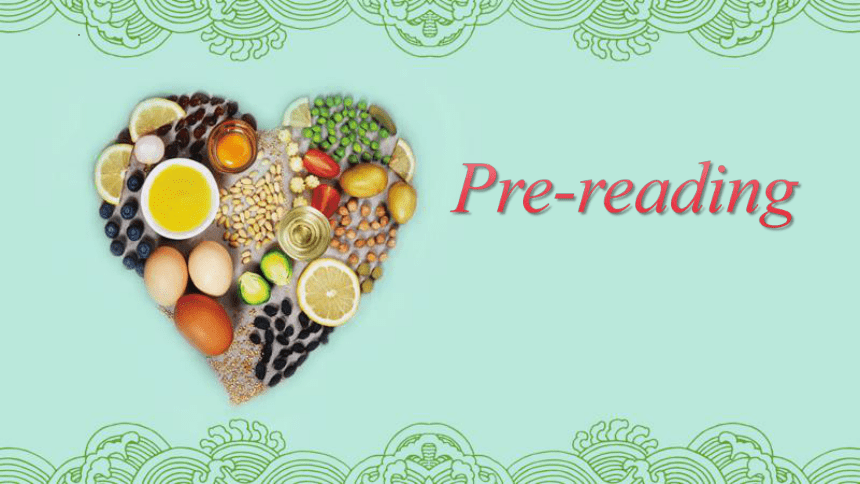



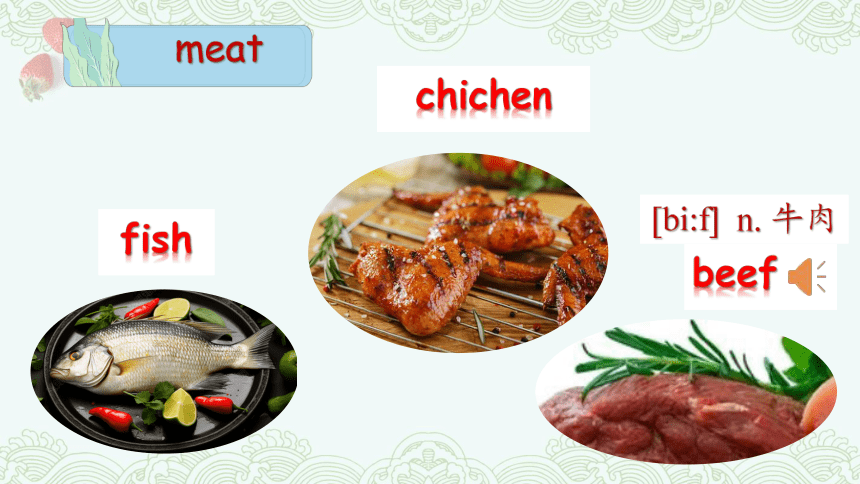
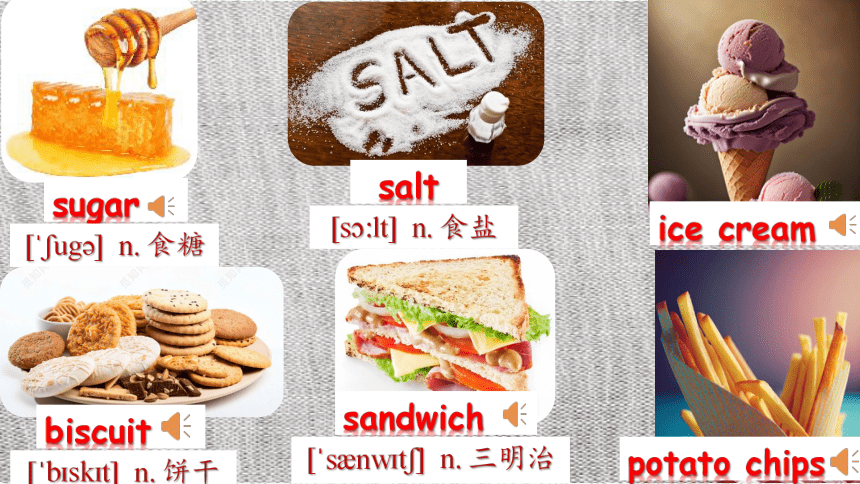
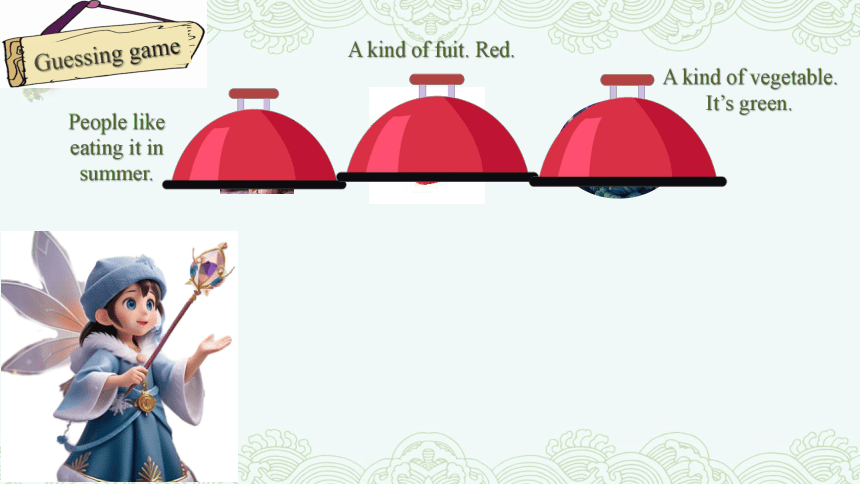
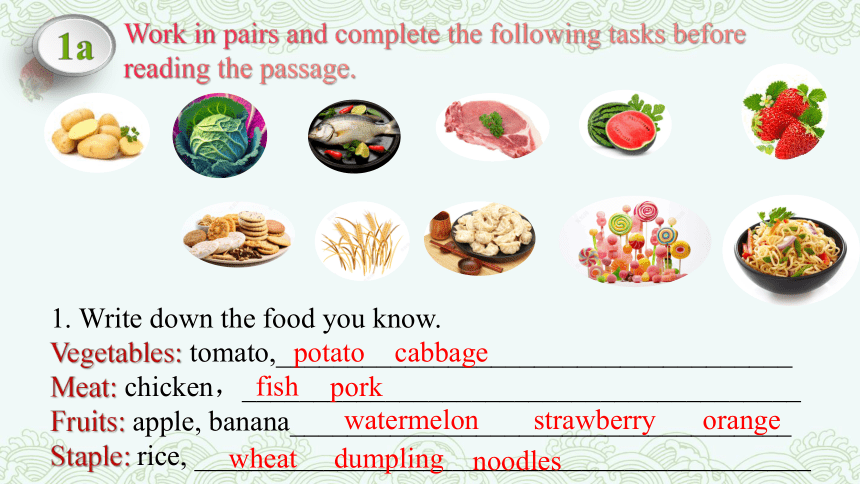

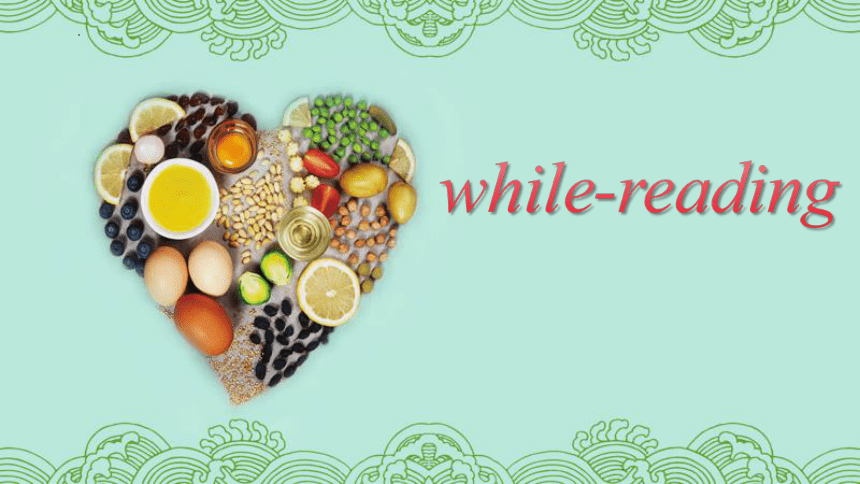

文档简介
(共36张PPT)
Pre-reading
New words
staple
[ ste pl] n. 主食
wheat
[wi:t] n. 小麦
rice
vegetables
cabbage
[ k b d ]
n. 卷心菜
tomato
[t ma:t u]
n. 西红柿
potato
[p te t u] n. 土豆
fruits
watermelon
[ w :t (r)mel n]
n. 西瓜
strawberry
[ str :b ri]
n. 草莓
meat
fish
chichen
beef
[bi:f] n. 牛肉
sugar
[ ug ] n. 食糖
salt
[s :lt] n. 食盐
ice cream
biscuit
[ b sk t] n. 饼干
sandwich
[ s nw t ] n. 三明治
potato chips
Guessing game
A kind of fuit. Red.
People like eating it in summer.
A kind of vegetable. It’s green.
1. Write down the food you know.
Vegetables: tomato,____________________________________
Meat: chicken,_______________________________________
Fruits: apple, banana___________________________________
Staple: rice, ___________________________________________
Work in pairs and complete the following tasks before reading the passage.
1a
potato
cabbage
fish
pork
watermelon
strawberry
orange
wheat
dumpling
noodles
Make a survey
What do you usually have for meals
I usually have ______________ for my breakfast.
I usually have ______________ for my lunch.
I usually have ______________ for my supper.
while-reading
Skimming
Get the main idea
What’s the main idea about this passage
A. Maria’s teeth were very weak.
B. Too much salt or sugar might cause illness.
C. Mothers always tell their children what they
should eat.
D. Michael didn’t like cabbage.
topic sentence
Scanning
What Mothers Said to Eat
Kangkang’s mother
less salt or sugar
Maria’s mother
no candy or ice cream
Jane’s mother
drink milk
Michael’s mother
more vegetables and fruits
Careful reading
Paragraph 2
When Kangkang was a child, his mother often told him, “Be careful not to eat too much salt or sugar”. She said it might cause illness.
tell sb. (not) to do sth.
告诉某人(不要)做某事
小心;当心
may的过去式
n. 疾病(复数:illnesses)
too much 修饰不可数名词
考点:
(1) or 连词,意为“或,或者,还是”,用于表示连接、替换的词、短语或从句。
延伸:or还可意为“也不”,用于否定句中,连接连接两种或多种事物时,相当于肯定句中的and。
(2) or 还有“否则,不然”之意。
eg. Study hard, or you won’t pass the exam.
及时练习:用and 或or完成句子。
1. Leo doesn’t like bread ______ milk.
2. Hurry up, ______ we’ll be late.
3. I have a brother ______ a sister.
4. Is that an orange ______ an apple
1. Be careful not to eat too much salt or sugar.
当心,不要吃太多的盐和糖。
or
or
and
or
Language points
Paragraph 3
Maria’s mother always took care of Maria very well. For example, Maria’s teeth were very weak, so her mother said that she mustn’t eat too much candy or ice cream.
take care of sb. well = take good care of sb. = look after sb. well = care for sb. well
mustn’t 表示“不许,禁止”。
此句为否定句,后面用or连接两个名词,不用and。
be weak 是弱的,差的
链接:be weak in... 在......方面差
Paragraph 4
Milk is a healthy drink. Jane didn’t like it, but her mother always forced her to drink it. Every morning before she left for school, she had to drink a glass of milk because her mother was always watching her.
leave for sp.
前往某地,动身去某地
force sb. to do sth.
强迫某人做某事
have/has/had to do sth.
不得不/必须做某事
must do sth. 必须做某事
本句是主从复合句,从句是由从属连词because引导的,表示“原因状语从句”。
它既可置于主句之后,也可置于主句之前。
置于主句之前,常用逗号隔开,表示强调。
eg. Adam was late because he didn't catch the early bus.
Because Adam didn't catch the early bus, he was late.
2. ...she had to drink a glass of milk because her mother was always watching her.
Language points
Paragraph 5
During Michael’s childhood, he had to eat many vegetables and fruits to keep healthy. Once, cabbage
was on his plate. As soom as Michael saw it, he got mad. But his mother made him taste it. He was surprised to find that it was delicious!
have/let/make sb. do sth.
让某人做某事
go/get mad
发疯,生气
taste vt. “品尝”,后跟名词或代词
n. “味道;品味”
link-v. 系动词,“尝起来”,后跟形容词
考点:
句中的...as soon as ...意为“一......就......”,常用于引导时间状语从句,当主句用将来时态时,从句要用一般现在时表示将来。
(主将从现)
eg. I’ll call you as soon as I get home.
注:as soon as possible意为“尽快”。
及时练习:
1. I _____ you as soon as Mr. Zhang ______ at the airport this afternoon.
A. will meet; will arrive
B. will meet; arrives
C. meet; arrives D. meet; will arrive
3. As soon as Michael saw it, he got mad.
迈克尔一看见它就生气。
B
Language points
①look, sound, smell, taste, feel, 这五个动词均可作连系动词,意为:
看 / 听 / 闻 / 尝 / 摸起来……
②这些动词后面也可接介词like,意为"看起来 / 听起来 / 感觉好像……"。
③感官动词+do 与+doing的区别:
感官动词 see, watch, notice, hear
+ do 表示动作的完整性;
+doing 表示动作的进行性。
4. But hias mother made him taste it.
Language points
考点:
surprised adj. “吃惊的,感到惊讶的”(用来描述人)
surprising adj. “令人惊讶的”(用来描述事物)
eg. What surprising news!
be surprised to do sth. = do sth. in surprise
吃惊地做某事
sth. surprises(v.) sb. 某物/某事使某人惊讶。
eg. His sudden coming surprised us all.
拓展: to one’s surprise(n.) 是某人惊讶的是
in surprise (n.) 惊讶地
be surprised(adj.) at +n. 对某事感到吃惊。
5. He was surprised to find that it was delicious.
他吃惊地发现它(白菜)很好吃。
Language points
及时练习:用surprise的各种词性填空。
1. To my ________, he is a thief(小偷).
2. The news is ________ .
3. Mr. Li was very ________ to see his son on the tree.
= Mr. Li saw his son on the tree in ________.
4. Her words ________ me a lot at that time.
surprise
surprising
surprised
surprise
surprised
v. 使某人惊讶
Watch the flash and pay attention to the details
Post-reading
Read 1a and match the following sentences with the pictures.
Drink milk. B. Don’t eat too much salt or sugar.
C. Eat vegetables and fruit.
D. Don’t eat too much candy or ice cream.
1b
A
D
B
C
Read 1a again and circle True or False.
1. Kangkang’s mother often told him not to eat much sugar when he was a child.
2. Maria’s teeth were not strong because she liked eating ice cream.
3. Jane didn’t like drinking milk.
4. By chance Michael found that cabbage was good.
5. Often our mothers’ advice is good for our health.
1c
True
False
True
True
True
Task
Look at the foods that Danny eats and discuss if they are healthy. If not, give your advice.
Danny’s meals
Breakfast: sandwich, potato chips
Lunch: rice with a lot of meat,
such as chicken, beef, etc.
Dinner: fish, strawberries,
ice cream
At night: candy, chocolate,
biscuit
My advice: __________________
__________________
2
Discuss whether Danny’s eating habits are healthy.
He likes eating sandwiches and
potato chips for breakfast.
2. At noon he usually has rice with a
lot of meat.
3. He doesn’t like eating vegetables at all.
4. He eats fish, strawberries and ice
cream for dinner.
5. He enjoys eating candy ,biscuit and
chocolate.
Look at the foods that Danny eats and discuss if they are healthy. If not, give your advice.
Give Danny some advice
Eating vegetables is good for your health.
2. Eating more fruit and less meat.
3. Don’t eat too much ice cream for dinner.
4. Don’t eat too much candy or chocolate.
5. ---
一. 根据句意及首字母提示补全单词
1. A ________ is a kind of fruit and it’s also a kind of
vegetable.
2. Eating too much salt may cause ________.
3. Jennie is still very ________ after leaving the hospital.
She should have a good rest at home.
4. The chicken is so delicious. Would you like to
________ it
5. Most children like eating ________ chips.
My son likes it, too.
Exercises
tomato
illness
weak
taste
potato
( ) 1. Be careful _____. The floor is wet (湿的).
A. to fall down B. not to fall down
C. not falling down D. not do falling down
( ) 2. To find better work in the future, parents often _____ their
children more skills.
A. force; learning B. force; learn
C. force; to learn D. force; not to learn
( ) 3. I _____ you as soon as Michael _____ back.
A. will tell; comes B. tell; will come
C. will tell; will come D. tell; comes
( ) 4. We shouldn’t _____ others _____ what we don’t want.
A. make; to do B. make; do
C. ask; do D. have; to do
Exercises
B
C
A
B
二、单选。
三、句型转换。
1. He goes to school but he doesn’t have breakfast.(同义句转换)
He goes to school _________ breakfast.
2. We should brush our teeth twice a day. (对画线部分提问)
_______ ________should we brush our teeth
3. Staying up too late is bad for your health (同义句转换)
______ _______ bed late is bad for your health.
4. You'd better play sports right after meals.(改为否定句)
You ______ ______ ______ play sports right after meals.
Exercises
without
How often
Going to
had better not
What should we eat to keep healthy
Discuss and give a report like this:
We all want to be healthy. So we …
should shouldn’t
must mustn’t
had better had better not
have to need
Summary
Homework
1. Read 1a.
2. Memorize the useful expressions and key sentences which we learn today.
3. Finish Section C in your workbook.
4. Preview Section D.
Thank you!
Pre-reading
New words
staple
[ ste pl] n. 主食
wheat
[wi:t] n. 小麦
rice
vegetables
cabbage
[ k b d ]
n. 卷心菜
tomato
[t ma:t u]
n. 西红柿
potato
[p te t u] n. 土豆
fruits
watermelon
[ w :t (r)mel n]
n. 西瓜
strawberry
[ str :b ri]
n. 草莓
meat
fish
chichen
beef
[bi:f] n. 牛肉
sugar
[ ug ] n. 食糖
salt
[s :lt] n. 食盐
ice cream
biscuit
[ b sk t] n. 饼干
sandwich
[ s nw t ] n. 三明治
potato chips
Guessing game
A kind of fuit. Red.
People like eating it in summer.
A kind of vegetable. It’s green.
1. Write down the food you know.
Vegetables: tomato,____________________________________
Meat: chicken,_______________________________________
Fruits: apple, banana___________________________________
Staple: rice, ___________________________________________
Work in pairs and complete the following tasks before reading the passage.
1a
potato
cabbage
fish
pork
watermelon
strawberry
orange
wheat
dumpling
noodles
Make a survey
What do you usually have for meals
I usually have ______________ for my breakfast.
I usually have ______________ for my lunch.
I usually have ______________ for my supper.
while-reading
Skimming
Get the main idea
What’s the main idea about this passage
A. Maria’s teeth were very weak.
B. Too much salt or sugar might cause illness.
C. Mothers always tell their children what they
should eat.
D. Michael didn’t like cabbage.
topic sentence
Scanning
What Mothers Said to Eat
Kangkang’s mother
less salt or sugar
Maria’s mother
no candy or ice cream
Jane’s mother
drink milk
Michael’s mother
more vegetables and fruits
Careful reading
Paragraph 2
When Kangkang was a child, his mother often told him, “Be careful not to eat too much salt or sugar”. She said it might cause illness.
tell sb. (not) to do sth.
告诉某人(不要)做某事
小心;当心
may的过去式
n. 疾病(复数:illnesses)
too much 修饰不可数名词
考点:
(1) or 连词,意为“或,或者,还是”,用于表示连接、替换的词、短语或从句。
延伸:or还可意为“也不”,用于否定句中,连接连接两种或多种事物时,相当于肯定句中的and。
(2) or 还有“否则,不然”之意。
eg. Study hard, or you won’t pass the exam.
及时练习:用and 或or完成句子。
1. Leo doesn’t like bread ______ milk.
2. Hurry up, ______ we’ll be late.
3. I have a brother ______ a sister.
4. Is that an orange ______ an apple
1. Be careful not to eat too much salt or sugar.
当心,不要吃太多的盐和糖。
or
or
and
or
Language points
Paragraph 3
Maria’s mother always took care of Maria very well. For example, Maria’s teeth were very weak, so her mother said that she mustn’t eat too much candy or ice cream.
take care of sb. well = take good care of sb. = look after sb. well = care for sb. well
mustn’t 表示“不许,禁止”。
此句为否定句,后面用or连接两个名词,不用and。
be weak 是弱的,差的
链接:be weak in... 在......方面差
Paragraph 4
Milk is a healthy drink. Jane didn’t like it, but her mother always forced her to drink it. Every morning before she left for school, she had to drink a glass of milk because her mother was always watching her.
leave for sp.
前往某地,动身去某地
force sb. to do sth.
强迫某人做某事
have/has/had to do sth.
不得不/必须做某事
must do sth. 必须做某事
本句是主从复合句,从句是由从属连词because引导的,表示“原因状语从句”。
它既可置于主句之后,也可置于主句之前。
置于主句之前,常用逗号隔开,表示强调。
eg. Adam was late because he didn't catch the early bus.
Because Adam didn't catch the early bus, he was late.
2. ...she had to drink a glass of milk because her mother was always watching her.
Language points
Paragraph 5
During Michael’s childhood, he had to eat many vegetables and fruits to keep healthy. Once, cabbage
was on his plate. As soom as Michael saw it, he got mad. But his mother made him taste it. He was surprised to find that it was delicious!
have/let/make sb. do sth.
让某人做某事
go/get mad
发疯,生气
taste vt. “品尝”,后跟名词或代词
n. “味道;品味”
link-v. 系动词,“尝起来”,后跟形容词
考点:
句中的...as soon as ...意为“一......就......”,常用于引导时间状语从句,当主句用将来时态时,从句要用一般现在时表示将来。
(主将从现)
eg. I’ll call you as soon as I get home.
注:as soon as possible意为“尽快”。
及时练习:
1. I _____ you as soon as Mr. Zhang ______ at the airport this afternoon.
A. will meet; will arrive
B. will meet; arrives
C. meet; arrives D. meet; will arrive
3. As soon as Michael saw it, he got mad.
迈克尔一看见它就生气。
B
Language points
①look, sound, smell, taste, feel, 这五个动词均可作连系动词,意为:
看 / 听 / 闻 / 尝 / 摸起来……
②这些动词后面也可接介词like,意为"看起来 / 听起来 / 感觉好像……"。
③感官动词+do 与+doing的区别:
感官动词 see, watch, notice, hear
+ do 表示动作的完整性;
+doing 表示动作的进行性。
4. But hias mother made him taste it.
Language points
考点:
surprised adj. “吃惊的,感到惊讶的”(用来描述人)
surprising adj. “令人惊讶的”(用来描述事物)
eg. What surprising news!
be surprised to do sth. = do sth. in surprise
吃惊地做某事
sth. surprises(v.) sb. 某物/某事使某人惊讶。
eg. His sudden coming surprised us all.
拓展: to one’s surprise(n.) 是某人惊讶的是
in surprise (n.) 惊讶地
be surprised(adj.) at +n. 对某事感到吃惊。
5. He was surprised to find that it was delicious.
他吃惊地发现它(白菜)很好吃。
Language points
及时练习:用surprise的各种词性填空。
1. To my ________, he is a thief(小偷).
2. The news is ________ .
3. Mr. Li was very ________ to see his son on the tree.
= Mr. Li saw his son on the tree in ________.
4. Her words ________ me a lot at that time.
surprise
surprising
surprised
surprise
surprised
v. 使某人惊讶
Watch the flash and pay attention to the details
Post-reading
Read 1a and match the following sentences with the pictures.
Drink milk. B. Don’t eat too much salt or sugar.
C. Eat vegetables and fruit.
D. Don’t eat too much candy or ice cream.
1b
A
D
B
C
Read 1a again and circle True or False.
1. Kangkang’s mother often told him not to eat much sugar when he was a child.
2. Maria’s teeth were not strong because she liked eating ice cream.
3. Jane didn’t like drinking milk.
4. By chance Michael found that cabbage was good.
5. Often our mothers’ advice is good for our health.
1c
True
False
True
True
True
Task
Look at the foods that Danny eats and discuss if they are healthy. If not, give your advice.
Danny’s meals
Breakfast: sandwich, potato chips
Lunch: rice with a lot of meat,
such as chicken, beef, etc.
Dinner: fish, strawberries,
ice cream
At night: candy, chocolate,
biscuit
My advice: __________________
__________________
2
Discuss whether Danny’s eating habits are healthy.
He likes eating sandwiches and
potato chips for breakfast.
2. At noon he usually has rice with a
lot of meat.
3. He doesn’t like eating vegetables at all.
4. He eats fish, strawberries and ice
cream for dinner.
5. He enjoys eating candy ,biscuit and
chocolate.
Look at the foods that Danny eats and discuss if they are healthy. If not, give your advice.
Give Danny some advice
Eating vegetables is good for your health.
2. Eating more fruit and less meat.
3. Don’t eat too much ice cream for dinner.
4. Don’t eat too much candy or chocolate.
5. ---
一. 根据句意及首字母提示补全单词
1. A ________ is a kind of fruit and it’s also a kind of
vegetable.
2. Eating too much salt may cause ________.
3. Jennie is still very ________ after leaving the hospital.
She should have a good rest at home.
4. The chicken is so delicious. Would you like to
________ it
5. Most children like eating ________ chips.
My son likes it, too.
Exercises
tomato
illness
weak
taste
potato
( ) 1. Be careful _____. The floor is wet (湿的).
A. to fall down B. not to fall down
C. not falling down D. not do falling down
( ) 2. To find better work in the future, parents often _____ their
children more skills.
A. force; learning B. force; learn
C. force; to learn D. force; not to learn
( ) 3. I _____ you as soon as Michael _____ back.
A. will tell; comes B. tell; will come
C. will tell; will come D. tell; comes
( ) 4. We shouldn’t _____ others _____ what we don’t want.
A. make; to do B. make; do
C. ask; do D. have; to do
Exercises
B
C
A
B
二、单选。
三、句型转换。
1. He goes to school but he doesn’t have breakfast.(同义句转换)
He goes to school _________ breakfast.
2. We should brush our teeth twice a day. (对画线部分提问)
_______ ________should we brush our teeth
3. Staying up too late is bad for your health (同义句转换)
______ _______ bed late is bad for your health.
4. You'd better play sports right after meals.(改为否定句)
You ______ ______ ______ play sports right after meals.
Exercises
without
How often
Going to
had better not
What should we eat to keep healthy
Discuss and give a report like this:
We all want to be healthy. So we …
should shouldn’t
must mustn’t
had better had better not
have to need
Summary
Homework
1. Read 1a.
2. Memorize the useful expressions and key sentences which we learn today.
3. Finish Section C in your workbook.
4. Preview Section D.
Thank you!
同课章节目录
- Unit 1 Playing Sports
- Topic 1 I'm going to play basketball.
- Topic 2 I'll kick you the ball again.
- Topic 3 The school sports meet is coming.
- Unit 2 Keeping Healthy
- Topic 1 You should brush your teeth twice a day.
- Topic 2 I must ask him to give up smoking.
- Topic 3 Must we exercise to prevent the flu?
- Unit 3 Our Hobbies
- Topic 1 What's your hobby?
- Topic 2 What sweet music!
- Topic 3 What were you doing at this time yesterday
- Unit 4 Our World
- Topic 1 What's the strongest animal on the farm?
- Topic 2 How can we protect ourselves from the eart
- Topic 3 The Internet makes the world smaller.
